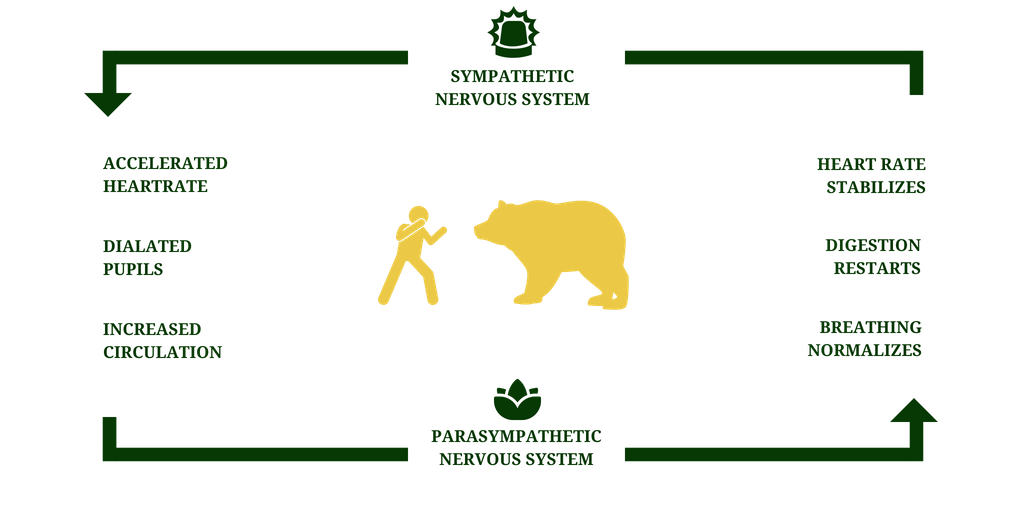
For most people, "stress" is negative - the word triggers images of people running around in circles, yelling obscenities, and pulling their hair out. But can stress be positive?

For most people, "stress" is negative - the word triggers images of people running around in circles, yelling obscenities, and pulling their hair out. But can stress be positive?
Moderation is key for most things in life and, believe it or not, that includes stress. Low to moderate levels can actually be beneficial. For example, a little pre-exam stress is a great motivator for a student to study harder and, thus, be more prepared. Butterflies before a first date are an overlooked reason that many of us dress our best and act increasingly attentive to what our date has to say.
Above all, stress can ensure our survival.
Imagine that you are sitting in the quad minding your own business while you wait for class to start. Out of nowhere, a giant bear walks up (are they native to Beaumont? Just go with it.).
In the fraction of a second that it takes you to consciously decide how you are going to respond to this ferocious beast, your body has already begun to prepare. Before you ever come to your decision, your nervous system is already equipping your body by boosting the systems that will help you fight or run and shutting down other systems to conserve energy.
When stress gets out of control, due to severity or frequency, and starts to impact our quality of life it becomes problematic. The same physiological changes that helped you battle the bear can have long-term, negative impacts when not properly managed. This can manifest both physically and mentally.
Physically, prolonged stress can cause increases in muscle tension (headaches, pain), poor sleep, high blood pressure, increased skin issues or breakouts, decreased immune response, higher blood sugar, and various gastrointestinal issues.
Mentally, stress can make us feel irritable or moody, make it more difficult for us to concentrate or remember things, and limit our ability to problem solve.

The central nervous system, which controls most functions of our brain and body, contains multiple sub-systems including the autonomic nervous system (ANS). The ANS is responsible for regulating all unconscious functions of our body such as our breathing rate, heartbeat, and digestion.
The ANS is further divided into the sympathetic and parasympathetic nervous systems. Imagine the sympathetic nervous system (SNS) as your alarm system. When the bear enters the quad, your SNS has been evolutionarily trained to kick in and ramp up all unconscious systems that will help us fight, flight, or freeze (i.e., whatever gives us the best chance of survival).
Our heart rate increases, pumping more blood throughout our organs and muscles, our breathing increases to prepare us for action, and our pupils dilate to improve visual acuity. Less important systems like digestion are shut down to conserve energy for the most important systems that will help with our continued existence (that sandwich you had earlier can get digested later).
Whenever danger has been managed or avoided, our parasympathetic nervous system kicks in. This system is similar to getting an “all clear” during a fire drill. Less vital functions kick back on, our breathing and heart rate return to normal levels, and our bodies begin to return to a state of normalcy.
Back in the days of cavemen, this was an excellent feature. You hear rustling in the bushes while visiting your local watering hole, and the sympathetic nervous system sends alarm bells through your body to say “Get out of here! Danger!”
Caveman runs from the watering hole and lives another day to hunt and/or gather.
Presently, however, the dangers of being devoured by lions, tigers, and bears are few and far between. What was once a very valuable system for our survival has not quite adapted to the much safer lives we lead in the present day.
Where does stress come from?
Seems obvious as a student, right? Midterms? Finals? Stress also stems from relationships with others, work issues, illnesses (personal or a loved
However, a big issue with stress is its insidious nature. It may seem obvious, but many people struggle to identify stress triggers so they are not aware of their stress levels until they are ready to explode. The reality is that stress is as inevitable as death and taxes - we all face some level of stress in our lives.
While many of us prioritize and schedule important meetings, paper deadlines, and midterm exams, we don't give the same priority to self-care and stress management. Research shows that if we can adopt behaviors that help manage stress after (or before) it occurs, we can decrease its negative effects and improve our response.
1. Identify your stressors.
One of the easiest ways to manage stress is to learn what is causing it. If we view stress on a scale of 1-10 (1 = lowest level), most of us don't notice that we are feeling stress until we are well past level 5. By taking a few moments in our day to stop what we're doing and sit in self-awareness, we can take stock of how we're feeling and if our stressors are in or out of our sphere of control.
If your triggers are out of your control, spend some time focusing on the things you do control. For example, we can't change the deadline for an assignment, but maybe we can start preparing by researching or starting an outline. We can't control the behaviors of others, but maybe we can control how we respond and how much time we spend around people whose behaviors cause us stress.
2. Use relaxation techniques.
Imagine yourself as a castle. When you learn and use tools such as diaphragmatic (deep) breathing, progressive muscle relaxation, guided imagery/visualization, and mindfulness meditation you are adding a brick to your defense wall around you. The more you engage in positive practices, the better your defenses will be against outside stressors.
Check out apps like Insight Timer or Headspace, or search YouTube for relaxation tutorials and guided meditations.
3. Learn problem-solving skills.
Writing through this process allows us to externalize the stressors jumbled in our heads and think about solutions in a logical and systematic way.
4. Exercise.
Exercise is an incredible, underrated tool for supporting good mental health. It gives us more energy, improves sleep, and aids relaxation. Exercising with others can give us valuable social support while exercising alone can give us time to think through and process our problems, confronting them with a clear mind.
Make note, however, that balance is key. While good practice, exercise can also be abused as a form of procrastination. You may become a pro athlete from all your exercising, but that midterm exam or paper will still haunt you.
5. Improving sleep habits.
Sleep is vital for both physical and mental health. Good sleep hygiene, such as keeping a regular sleep schedule or having a bedtime routine can go a long way in terms of improving your sleep.
6. Set boundaries and communicate assertively.
Making boundaries and expectations known to others gives us a chance to express our wants, needs, and desires in a clear and straightforward manner, while still respecting the viewpoints of others.
Not to be mistaken with aggressive communication (which can leave no room for compromise and can hurt our relationships with others) assertive communication allows us to ask for what we want and set boundaries we need to manage our stress. If others are taking advantage, assertive communication allows you to place a boundary and express your viewpoints in a way that conveys a clear message but is less likely to lead to arguments or communication breakdowns. This form of communication is not second nature and takes practice, however, there are endless resources on learning to communicate more assertively.
7. Redefine your beliefs about stress.
Because stress is inevitable, experts have begun to shift focus on how it is perceived. Leading expert and health psychologist, Dr. Kelly McGonigal, gives an informative TED Talk concerning views on stress. Her 15-minute talk discusses how, by shifting our attitude about stress, we can also shift the way it impacts us.
While life has many ups and downs, learning to better navigate the difficult and cumbersome aspects of it can help increase our quality of life.
Throughout my academic journey, I often learned the hard way when I wasn’t managing my stress effectively. As a psychologist, I work primarily with adults and have noticed missing pieces in the education most people receive in their youth. We learn algebra, chemistry, language arts, etc., but many of us do not learn primary information about managing emotions and mental health.
Learning to better handle and respond appropriately to stress, and to care for ourselves emotionally, can help us lead longer and fuller lives. By adopting a stress management practice now, you can help yourself, and those around you, better navigate your world, living your life the way you want.

The opinions and statements found on the Lamar University blog belong solely to the articles' authors and contributors and do not necessarily represent the those of Lamar University. Lamar University does not endorse products (unless otherwise stated) and encourages students to use critical thinking and good judgment while navigating online.